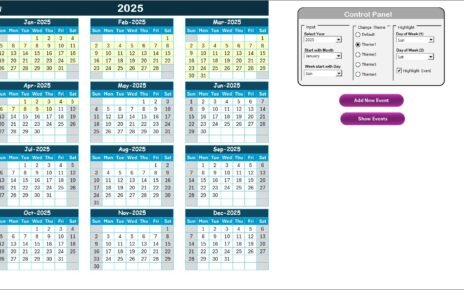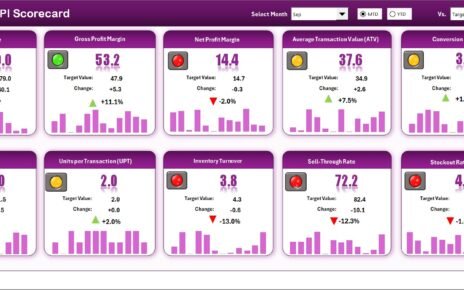Organizing employee training sessions can get chaotic, especially when you have multiple requests, departments, and time slots to manage. That’s why we created the Training Schedule Request Tracker in Excel—a simple yet powerful tool to help HR managers and team leaders stay on top of training requests.
In this guide, we will walk you through everything you need to know about this Excel-based tracker—from its unique features to best practices, and even answer some of your most common questions. So let’s dive right in!
Click to Purchases Training Schedule Request Tracker in Excel
What Is the Training Schedule Request Tracker in Excel?
The Training Schedule Request Tracker is a ready-to-use Excel tool, powered with VBA automation, that helps you capture, organize, and manage training requests efficiently.
Whether you’re handling weekly workshops or planning quarterly upskilling sessions, this tool is built to simplify data entry, scheduling, tracking, and reporting—all in one centralized Excel workbook.
Key Features of the Training Schedule Request Tracker
Let’s break down the core features of this tool that make it stand out from a typical spreadsheet.
Login Form for Secure Access
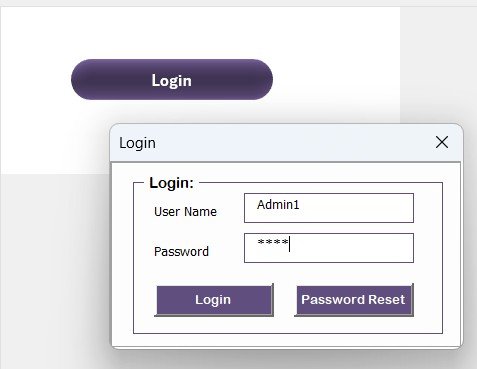
- When you open the file, the first thing you’ll see is a Login Form.
- You can log in using the default User ID: Admin1 and Password: abcd.
- Pressing Enter or clicking the Login button takes you to the main dashboard.
- This layer of security ensures that only authorized users can access and modify the tracker.
Main Form – Control Center
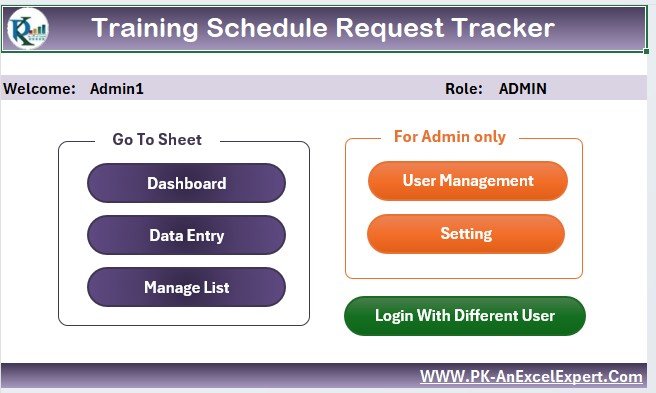
- The Main Form acts as your control panel.
- From here, you can navigate the tracker, manage records, and view training summaries.
- Easy-to-understand buttons guide you to different sections of the workbook.
Dashboard Sheet – Visual Analytics at a Glance
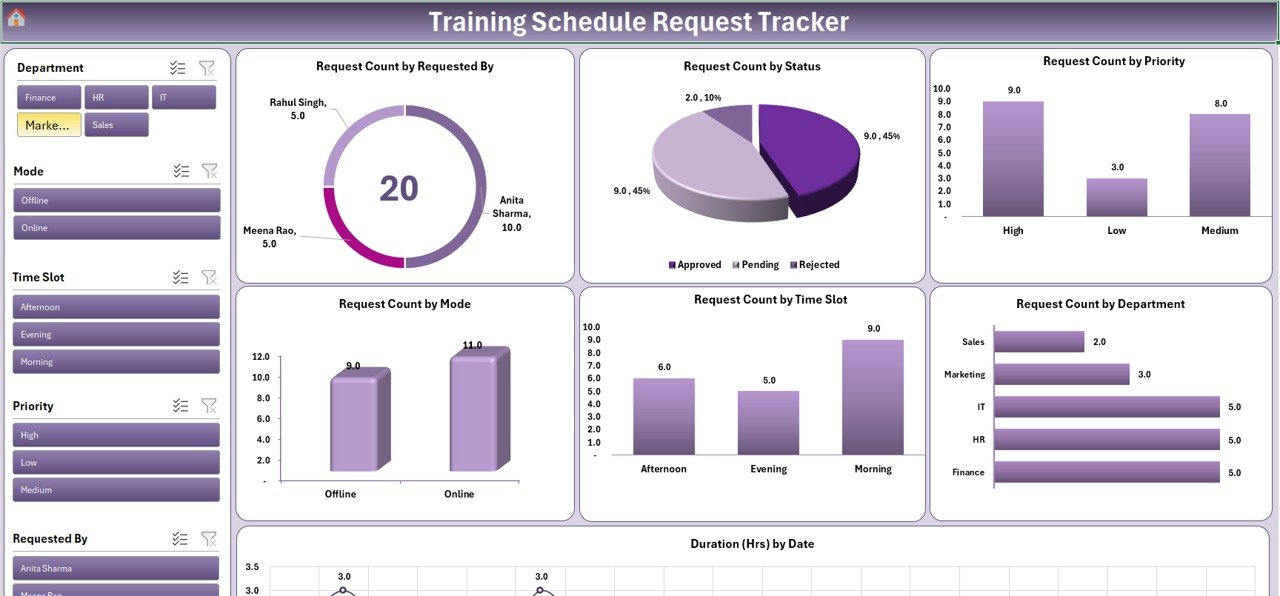
This sheet provides a comprehensive visual overview using 6 slicers and 7 interactive charts:
📊 Request Count by Requested By – Doughnut Chart
📈 Request Count by Priority – Column Chart
📍 Request Count by Mode – Column Chart
🕒 Request Count by Time Slot – Column Chart
🏢 Request Count by Department – Bar Chart
📆 Duration (Hours) by Date – Line Chart
🧩 Overall Request Count – Pie Chart
Each slicer allows you to filter data quickly, enabling smart decision-making and tracking.
Data Entry Sheet – Organized Data Collection
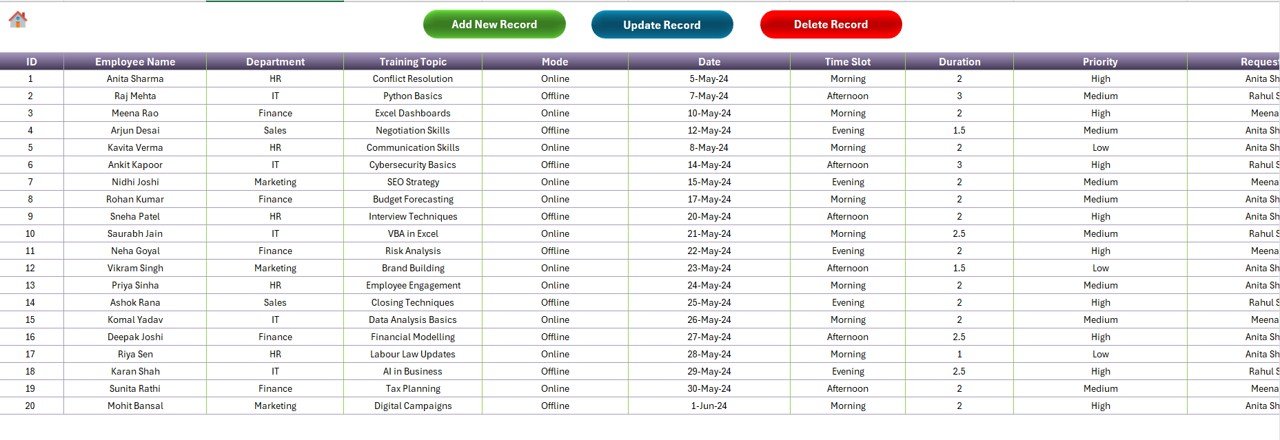
This sheet includes all the crucial columns:
- ID, Employee Name, Department, Training Topic, Mode
- Date, Time Slot, Duration, Priority, Requested By
- Request Date, Status, and Remarks
At the top, you’ll find 3 powerful buttons:
✅ Add New Record
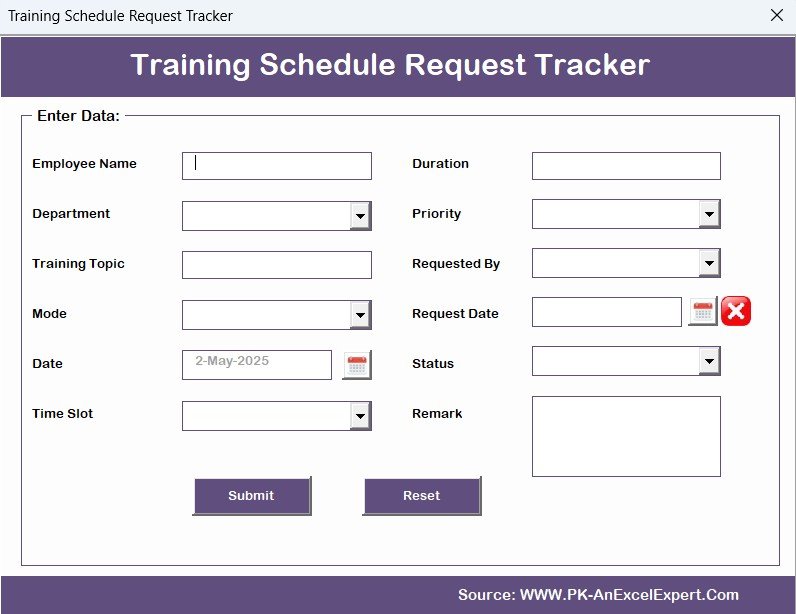
- Opens a user-friendly data entry form
🛠️ Update Record
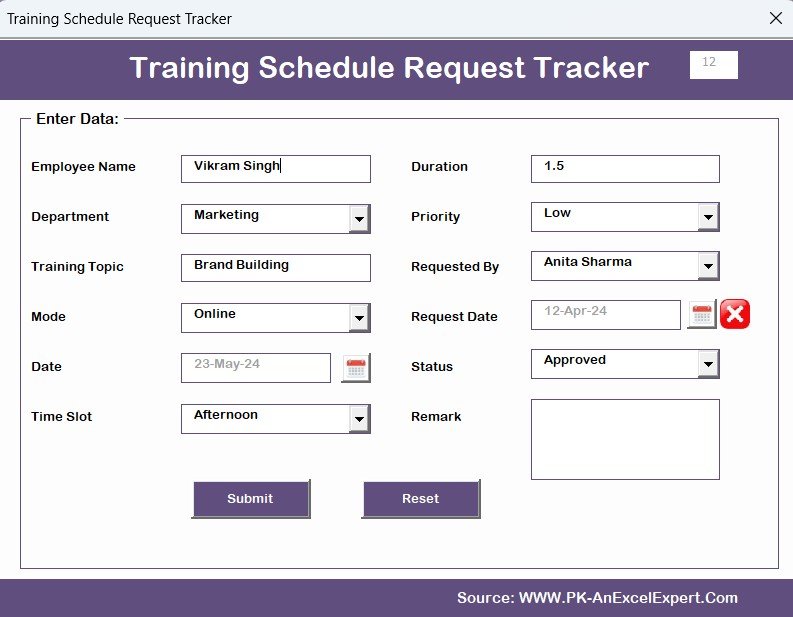
- Allows you to modify any existing entry by selecting its ID
🗑️ Delete Record – Lets you delete any record with confirmation prompts
Every action triggers an automatic dashboard refresh to reflect the latest changes.
Manage List Sheet – Dynamic Drop-down Lists
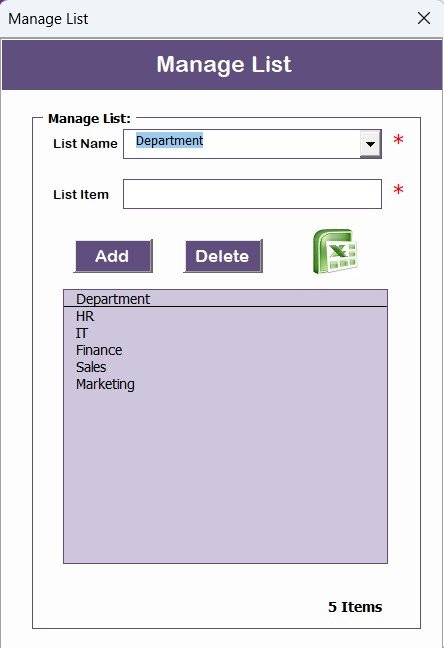
This backend sheet enables you to customize drop-down menus for:
Click to Purchases Training Schedule Request Tracker in Excel
- Departments, Modes, Time Slots, Priority Levels, Status, and Requested By
You can Add or Delete values using buttons, making this tracker highly flexible and adaptable to your company’s structure.
Support Sheet – Behind-the-Scenes Engine

Although hidden by default, this sheet contains all pivot tables powering the dashboard charts. You don’t need to edit anything here—just let it do the magic in the background.
User Management
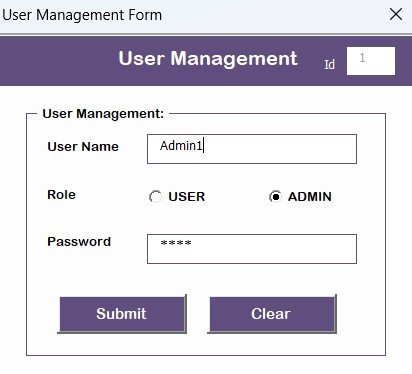
Control who can access the tracker with this feature.
- Add, update, or delete users
- Assign roles and change passwords
- Enable secure multi-user login access
Why Do You Need a Training Schedule Request Tracker?
Without a centralized system, you’ll likely deal with:
- Missed training requests
- Scheduling conflicts
- Difficulty tracking training hours
- Unorganized reporting
- This tracker ensures all training requests are:
- Logged in real time
- Easily searchable
- Properly scheduled and approved
- Measured in terms of hours and attendance
Advantages of Using the Training Schedule Request Tracker in Excel
Let’s take a closer look at what makes this tool essential for HR and L&D teams:
📌 Easy to Use: The form-based entry means anyone can use it without prior Excel expertise.
🔄 Real-Time Dashboard Updates: Charts and analytics update automatically, keeping your team aligned.
🔒 Secure Access: The login and user management system ensures only approved personnel can access or change data.
📋 Clean Record-Keeping: Avoid duplicate entries and keep a record of every training request in one place.
🧩 Fully Customizable: You can change dropdown options, add departments, and rename priorities to fit your needs.
Best Practices for the Training Schedule Request Tracker
Want to make the most of this tool? Follow these practical tips:
- Keep the List Sheet Updated: Add all new departments, training modes, and priorities to the Manage List Sheet regularly. This ensures consistency in dropdown options.
- Encourage Employees to Use the Form: Avoid manual entries in the raw data table. Use the Add New Record button to ensure data integrity.
- Protect Sensitive Data: Hide the Support Sheet and Settings Sheet to avoid accidental edits. Enable password protection where needed.
- Archive Monthly Data: At the end of each month, create a backup copy of the file to maintain historical training records.
How Does It Work? Step-by-Step Overview
Here’s how you can start using the tracker today:
Step 1: Log In
Use your credentials to access the file. Admins can manage users and change passwords.
Step 2: Add a Training Request
Click “Add New Record”
➡️ Fill in Employee Name, Topic, Date, Time Slot, etc.
➡️ Click Submit
Step 3: Monitor via Dashboard
- Navigate to the Dashboard Sheet to visualize:
- How many requests came in
- Which departments requested training
- Priority level and time slot preferences
Step 4: Update or Delete Requests
Click the ID in the Data Sheet, hit “Update” or “Delete” as required.
Use Cases in Real-World Scenarios
- HR Departments – Track employee upskilling requests by team
- L&D Teams – Understand high-demand topics and plan budgets
- Project Managers – Ensure timely training before project kick-offs
- Remote Teams – Monitor virtual training modes and time zones
Customizing the Tracker for Your Organization
The tool is fully adaptable. You can:
- Add columns for Trainer Names or Feedback
- Use conditional formatting to highlight overdue requests
- Link it with a calendar or email reminders using VBA (advanced users)
Frequently Asked Questions (FAQs)
❓1. Can I use this tool without Excel VBA knowledge?
Yes, absolutely! The tool is ready to use out of the box. No coding required.
❓2. How many records can it store?
There’s no hard limit—Excel can handle thousands of records. But for optimal speed, keep it under 10,000 rows.
❓3. Can I modify dropdown options?
Yes. Go to the Manage List Sheet to add or remove dropdown values.
❓4. Is this tool mobile-friendly?
While Excel mobile supports some features, full functionality—including the forms—works best on a desktop.
❓5. How do I reset my password?
Admins can change passwords via the User Management section.
❓6. Can I use this for multiple users?
Yes. Different users can log in using unique credentials. The system supports multi-user access with role-based control.
❓7. What happens if I delete a record by mistake?
Unfortunately, deletion is permanent. Make sure you back up the file weekly to avoid accidental data loss.
❓8. Is the dashboard customizable?
Yes, you can change chart types, add filters, or modify colors as per your branding or analytics preference.
Conclusion
The Training Schedule Request Tracker in Excel is not just another spreadsheet—it’s a smart, structured, and secure solution for managing your organization’s training requests. From effortless data entry to instant dashboard insights, this tool saves time, reduces errors, and helps HR and L&D teams make informed decisions quickly.
Visit our YouTube channel to learn step-by-step video tutorials
Click to Purchases Training Schedule Request Tracker in Excel
Watch the step-by-step video Demo:

